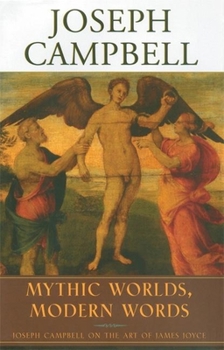Mythic Worlds, Modern Words: Joseph Campbell on the Art of James Joyce
Select Format
Select Condition 
Book Overview
Mythic Worlds, Modern Words provides a representation of Campbell s published writing, lectures on Joyce, and exchanges with his audiences, from his obituary notice on Joyce in 1941 to lectures delivered a few years before Campbell s death. Joyce scholar Edmund L. Epstein has arranged this material as running commentary on A Portrait of the Artist As a Young Man, Ulysses, and Finnegans Wake. With a new foreword by Phil Cousineau for this Collected...
Format:Hardcover
Language:English
ISBN:1577314069
ISBN13:9781577314066
Release Date:January 2004
Publisher:New World Library
Length:320 Pages
Weight:1.65 lbs.
Dimensions:1.3" x 5.5" x 8.5"
Customer Reviews
5 ratings
gerat stuff
Published by Thriftbooks.com User , 18 years ago
a great book. This a a thorough investigation on the roots of inspiration of the 20th century's greater novelist. A must!
Its return to print will delight Joyce and Campbell fans
Published by Thriftbooks.com User , 20 years ago
This informed and informative survey of the late Joseph Campbell's published writings and lectures on James Joyce will serve as both an introduction to Joyce's major works and as a critical survey of his literary, spiritual and psychological leanings. Mythic Worlds, Modern Worlds has been long out of print: its return to print will delight Joyce fans and Campbell readers alike.
Joyce as a lens on Campbell
Published by Thriftbooks.com User , 20 years ago
Joseph Campbell's encounter with the writings of James Joyce proved a major turning point in his life. After graduate work at Columbia (where he specialized in the Arthurian cycle, writing his thesis on "The Dolorous Stroke" delivered to the Grail King), he went to Paris to study medieval philology and Old French and Provencal.In 1927 Campbell purchased a copy of Joyce's Ulysses (which was banned in the United States), but could make neither heads nor tails of it. (I have to admit it is reassuring, given Campbell's intellectual reputation, to know that he too was stumped on occasion). Joe, full of exuberant confidence, tracked down Joyce's publisher, Sylvia Beach, at Shakespeare & Co., to express his "high academic indignation." Beach introduced Campbell to a body of work from diverse authors (Schopenhauer, Dante, Vico, etc.) that opened his understanding to what Joyce was doing. In Joe's own words, "...that was almost the end of my interest in medieval philology." During the period of Campbell's studies in Paris and in Germany, Joyce was publishing snippets of early versions of Finnegan's Wake as a work-in-progress, in the journal "transitions" - so Joe was able to follow the evolution of this protean opus long before it attained its final shape. Referring to these sketches, Campbell said, "That's what taught me. And there you have it. It's funny how it changed my career."Campbell was so sold on Finnegan's Wake - which most American critics dismissed as impenetrable, a self-indulgent exercise in literary masturbation - that in 1944 he authored, along with Henry Morton Robinson, "A Skeleton Key to Finnegan's Wake" - which remains influential in the field of Joycean criticism yet today. Anyone who spends any time with Campbell's work can't help but notice Joyce's influence on Campbell's thought: in fact, i'd go so far as to say an understanding of Joycean themes is essential to fully grasp Campbell's mythic perspective. That's not to say you won't "get Campbell" if you don't read Joyce - but both men are clearly swimming in the same ocean.For nearly sixty years Campbell followed in Sylvia Beach's patient, helpful footsteps, presenting ever wider audience with clues to enrich the reader's experience and understanding of Joyce's work. Besides the Skeleton Key (which is the first book to list Campbell as author, five years before the appearance of "The Hero With A Thousand Faces" - which itself was tentatively titled "How to Read A Myth"), JC wrote essays and delivered lectures on the subject, many of which have been collected in Campbell's "Mythic Worlds, Modern Words: Joseph Campbell on the Art of James Joyce," originally published by the Joseph Campbell Foundation (JCF) in 1993.The JCF released a new edition of "Mythic World, Modern Words" in late 2003. Edited by Joycean scholar Edmund L. Epstein, this volume has three major divisions, each examining one of Joyce's novels - "Portrait of the Artist as a Young Man," "Ulysses," and "Finnegan's Wake
A great book
Published by Thriftbooks.com User , 21 years ago
From his first encounter with Joyce's writings in Paris in 1927, Campbell remained deeply involved with the works of Joyce. He gave many lectures on Joyce, frequently read from his works, and published a number of articles on Joyce's works. This book provides a survey of Campbell's Joycean studies by conflating his articles and representative lectures, from his obituary notice on the death of Joyce in 1941 to lectures delivered within a few years of Campbell's death. Also included, in the "Dialogues" section, is a selection of Campbell's responses to questions from members of the audience at some of his lectures. Questions from listeners seemed to fire Campbell, and some of these exchanges provide a deeper insight into the material presented in the formal lectures. This book contains both elementary material and advanced analysis of the work of Joyce; it is, therefore, both an introduction to Joyce's major works and a major contribution to Joyce criticism. The whole provides a representative portrait of Joseph Campbell as a critic of Joyce. 304 pp. (From the back cover).
THE INNER WORKINGS OF A HERO<A WARRIOR>of day to day life
Published by Thriftbooks.com User , 25 years ago
For me this book helps parralell the inner workings of you or me, reminding me of the pathes we take, no matter the presence or withdrawl of glamour, are adventures..... IT IS A VALUABLE screenwriters source.





